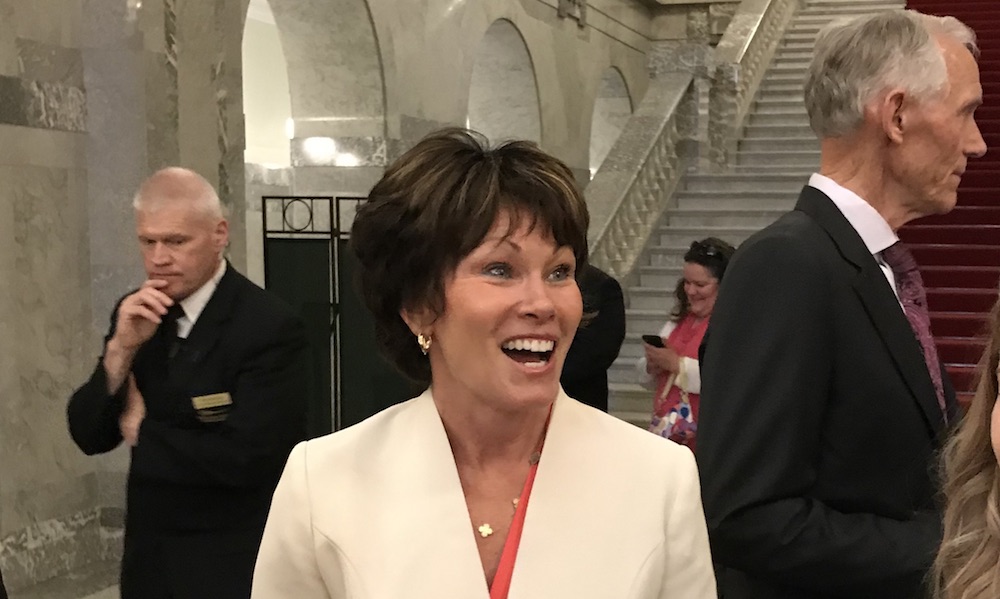If we ever do form the Western Wepublic of Wexit out here in Wild Rose Country, I guess we won’t be able to join the United Nations.
Too triggering.
There’s just something about the UN putting its oar into our affairs that sends Alberta politicians over the edge.
Guilty conscience?
Consider Minister of Energy Sonya Savage’s reaction yesterday to one of those rare occasions when the world body casts a baleful eye on local practices in Alberta that don’t come up to the aspirational standards agreed upon by the member nations of the UN, including Canada:
None of your beeswax, Savage said. Well, actually, those are my words, and she only said them metaphorically.
Here are her actual words, though, right out of the government press release: “With all the injustice in the world, it’s beyond rich that the unelected, unaccountable United Nations would seemingly single out Canada — one of the greatest champions of human rights, democracy and the rule of law.”
A decision of the most recent session of the UN’s committee on the elimination of racial discrimination, you see, called on Canada to halt all work on three resource-extraction megaprojects — including the Trans Mountain pipeline expansion project that has become the sine qua non of Alberta’s alienation anxiety despite Ottawa’s determined efforts to get it done — until the First Nations along its route give their approval. The other projects are the Coastal GasLink natural gas pipeline and the Site C hydroelectric dam, both in British Columbia.
The report also said the UN committee was:
- “Disturbed by forced removal, disproportionate use of force, harassment and intimidation by law enforcement officials against Indigenous peoples who peacefully oppose large-scale development projects on their traditional territories,” and …
- “Alarmed by escalating threat of violence against Indigenous peoples, such as the reported violent arrest and detainment of a Secwepemc defender against the Trans Mountain Pipeline Expansion project, on 19th October 2019.”
Accordingly, it asked the government of Canada, among several other things, “to guarantee that no force will be used against Secwepemc and Wet’suwet’en peoples and that the Royal Canadian Mounted Police and associated security and policing services will be withdrawn from their traditional lands,” and also “to prohibit the use of lethal weapons, notably by the Royal Canadian Mounted Police, against Indigenous peoples.”
This comes down to one of those rule of law things — Canada is a party to international and internal treaties to consult meaningfully with Indigenous peoples about resource projects that impact their way of life. Savage’s United Conservative Party has a lot of time for the rule of law — but only when the law lets the UCP enforce its own rules.
“Canada’s duly elected representatives — not unaccountable international committees — are responsible for governing decisions in this country,” Savage’s news release said, trowelling on the sarcasm and sense of grievance. This is pretty much exactly, it must be noted, what other authoritarian governments like those in Hungary and Russia have said in similar recent circumstances.
“We wish that the UN would pay as much attention to the majority of First Nations groups that support important projects such as Trans Mountain and Coastal GasLink,” Savage also complained. “First Nations leaders increasingly recognize that responsible natural resource development can serve as a path from poverty to prosperity for their people. Yet this UN body seemingly ignores these voices.”
Again, it’s a rule of law thing. We’ve signed on — constitutionally and by treaty — to a regime of consultation. And not all the First Nations along the route are in agreement — no matter how much work the governments of Canada, Alberta and British Columbia have done to divide and persuade them. Consultation takes time.
Naturally, the UCP is in a hurry. The business case for the TMX may be shaky, but the political case for getting it done before the next Alberta provincial election is solid.
One suspects the governments of British Columbia and Canada — who don’t share Premier Jason Kenney’s taste for symbolic coercion — would be just as happy if Savage wasn’t putting out unhelpful press releases designed to play to the UCP base.
She is right, though, that not all members of the United Nations have human rights records as good as Canada’s. But our human rights record is pretty good for all its imperfections because Canada is still subject the rule of law — and not just the UCP version. The committee’s aspirations, it could be argued, are based on Canadian aspirations.
The UN can’t enforce the standards it aspires to get us all to live up to. Not without the extraordinary intervention of the Security Council, anyway.
But UN rulings and decisions like this are not just embarrassing, they’re a useful public reminder to Albertans and other Canadians that our human rights standards are starting to slip and we need to pay attention.
That’s why criticism from the UN makes Alberta politicians so angry, one suspects. They’d very much prefer we weren’t paying attention at all.
David Climenhaga, author of the Alberta Diary blog, is a journalist, author, journalism teacher, poet and trade union communicator who has worked in senior writing and editing positions at The Globe and Mail and the Calgary Herald. This post also appears on David Climenhaga’s blog, AlbertaPolitics.ca.
Image: David J. Climenhaga



